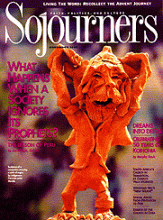A friend of mine, recently back from a trip to Calcutta, helped wash dishes after supper one evening. You never saw dishes scrubbed and rinsed with so little water. She said she couldn't use clean water in quite the same way as before her trip, adding offhandedly that she had cut her daily showers to one every two days.
How often have I taken for granted a hot shower on a cool evening, a drink of cold water after exercise, setting the washing machine level on high? I boil spaghetti in huge pots of water and wash dishes with the faucet running. Jackie's careful pouring of one cupful over a rack of plates was an eye-opener.
"Taken for granted" may not be exactly the right phrase, because I have always loved water. A favorite hiking ritual--back when you could drink straight out of Western streams--was to hold cupped hands in the air and watch sunlight catch in the droplets as they poured down my arms and dripped off my elbows. The highlight of summer was to dive deep in a lake, then surface and float face toward the sky, ears full of water and stopped to all voices, dogs, and airplanes. Water is spiritual; I am glad to see such a common yet mysterious substance play a role in Eucharist and baptism at church.
Because water was everywhere in my childhood, I never thought of it in the context of shortage. Other countries (even other American generations) had droughts and water-borne diseases. But not here, not now.
So it is quite frightening to think that something I need at every meal--the water it takes to grow food, to cook it, to wash dishes, to brush my teeth--may be next on the endangered list. We read of reservoirs silting in, gasoline storage tanks leaking into city wells, lead pipes poisoning home water supplies, and of the political battles over water (such as Wyoming's Arapahoe and Shoshone Indians wanting to keep river water for fish populations vs. alfalfa farmers wanting it for irrigation).
Read the Full Article

